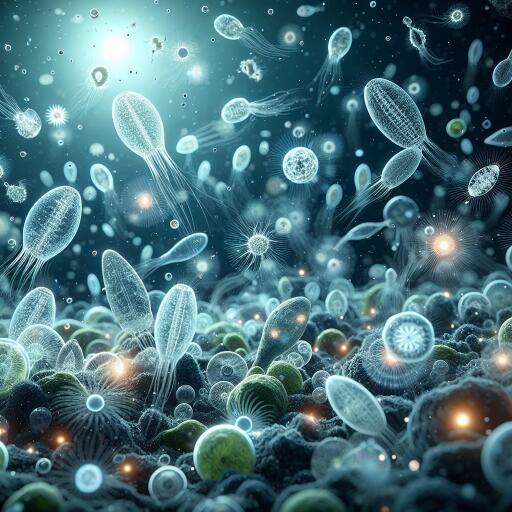
Plankton, Tiny Ocean Creatures, Are Absolutely Critical to Life on Earth
In the vast and mysterious expanse of the ocean, myriad creatures play their roles in the delicate balance of marine ecosystems. Among these, a group of organisms, often unnoticed yet fundamentally crucial, thrives beneath the surface. These are the plankton, specifically those measuring less than 0.02 millimeters in diameter, whose role in sustaining planetary health and life is monumental.
These microorganisms encompass the majority of planktonic populations, serving as the foundation upon which marine food webs are built. Their small size, however, has historically overshadowed their significance, leaving them out of the spotlight in discussions on global ocean policy.
Recent advancements in marine science and technology have begun to unveil the profound impact and the sheer abundance of these minuscule beings. Remarkable data suggest that they constitute up to 99.98% of the ocean’s planktonic abundance and 71% of its total biomass. Such figures underscore not only their abundance but also their critical contribution to marine ecosystems.
This revelation stems from a concerted effort by some of the UK’s leading marine scientists. Utilizing cutting-edge surveying techniques, the team set out to map the presence and ecological significance of these tiny ocean dwellers along the shores of the United Kingdom. Their work represents a crucial step toward recognizing the importance of these creatures.
Their vulnerability to changes in ocean temperature, nutrient availability, and the broader impacts of climate change highlights the urgency of incorporating their well-being into conservation strategies. Such environmental shifts pose significant risks, threatening the balance of marine ecosystems upon which they—and, by extension, we—depend.
The backbone of this research effort has been the pioneering use of technologies like flow cytometry and light microscopy, which have allowed scientists to document the prevalence of these organisms accurately. This process has unveiled their response to environmental changes, notably around areas like the English Channel and Scottish coasts.
Through diligent study, researchers have argued for the recognition of tiny plankton groups within critical biodiversity indicators and policy frameworks. This includes suggestions for their inclusion in the EU Marine Strategy Framework Directive (MSFD), OSPAR strategies, and the UK Marine Strategy. The call is for long-term, widespread monitoring to ensure policies are well-informed by comprehensive and precise data, thereby facilitating more effective conservation measures.
The transformative methodology of consistent, long-term measurement has been a game-changer. It has connected these microorganisms with meaningful indicators for policy use, charting their growth patterns in relation to human-induced environmental pressures.
This breakthrough research underscores the indispensable role of microscopic ocean plankton in maintaining marine ecosystem health and their substantial contributions towards global environmental stability. By integrating these tiny organisms into global ocean policy and conservation strategies, scientists are advocating for a paradigm shift in marine conservation. This shift recognizes and protects the integral role played by our ocean’s silent majority in supporting life as we know it.
Their findings underscore the necessity for enhanced monitoring and inclusion of microscopic plankton within biodiversity indicators. This approach ensures that policy decisions are backed by detailed and accurate ecological data, facilitating more targeted and effective conservation efforts. Ultimately, this research heralds a crucial call to arms in marine conservation, stressing the vital importance of acknowledging and safeguarding the foundational role of ocean plankton in sustaining life on Earth.
Like what you read? Subscribe to our newsletter for engaging articles, exclusive content, and the latest updates.





Leave a Reply